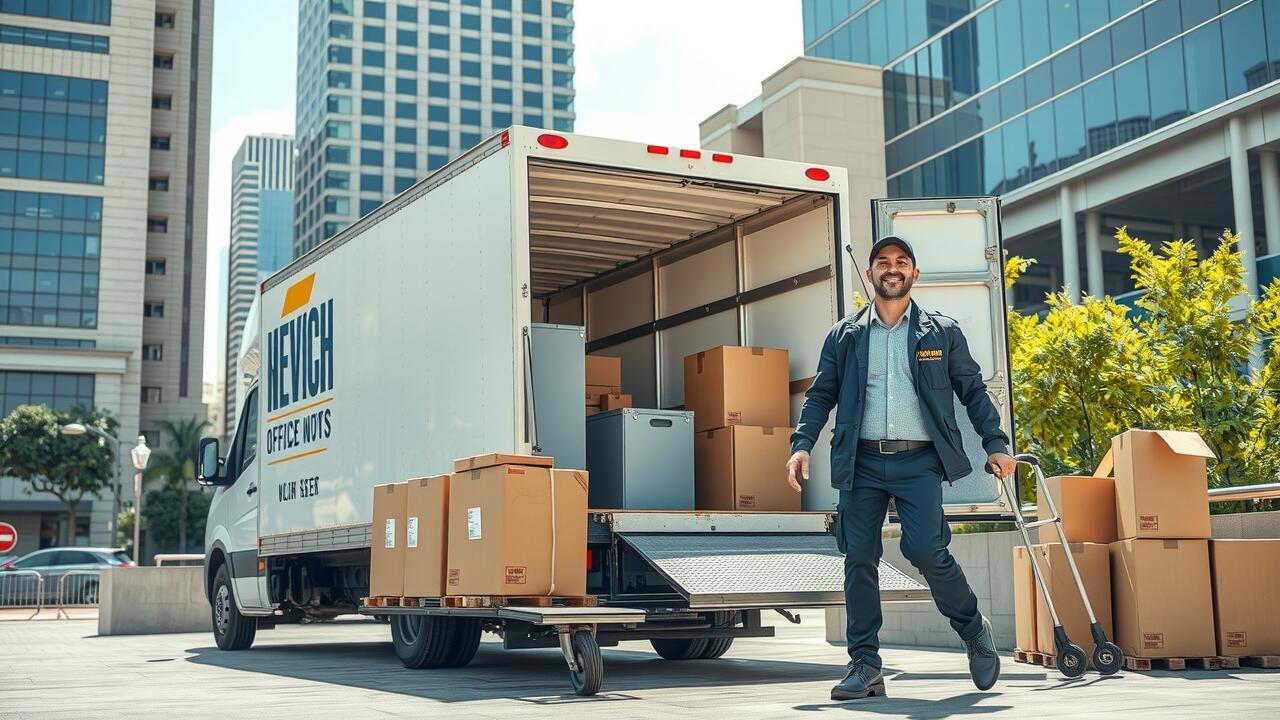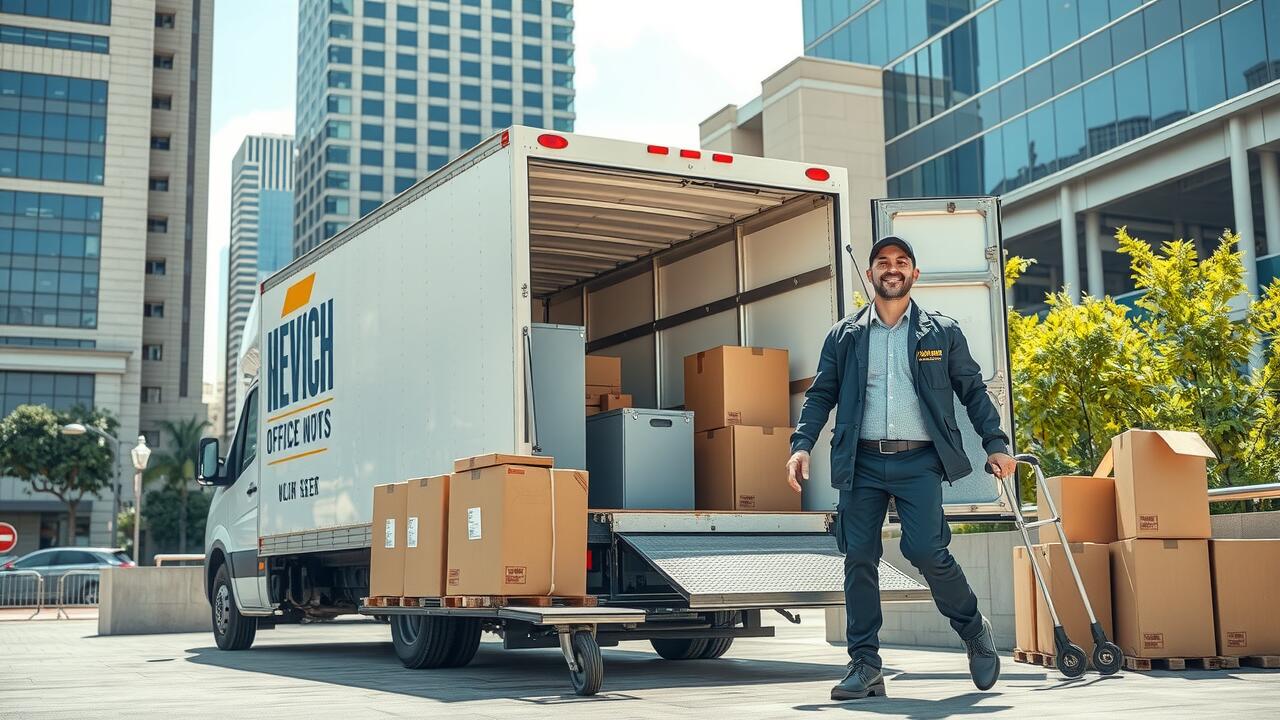
Table Of Contents
Choosing a Moving Company
Selecting the right moving company is critical for a successful commercial move. Businesses must prioritize companies with experience in handling various types of equipment and office setups. It's advisable to check for licenses and insurance to protect your assets during transit. Reviews and recommendations can provide insight into a company's reliability and professionalism. A reputable mover will also offer customized solutions that cater to specific business needs, ensuring a smoother transition.
When evaluating potential moving companies, consider their service offerings and availability. Whether you require packing services, temporary storage solutions, or specialized transportation for sensitive equipment, these factors are essential. Overlook, Bethesda Commercial Moving provides comprehensive options tailored to businesses of all sizes. Getting an accurate estimate and clear communication about timelines is crucial as well, preventing unexpected delays during your relocation.
What to Look for in a Commercial Mover
When selecting a commercial mover, it’s essential to consider their experience in handling business relocations. A company like Overlook, Bethesda Commercial Moving provides specialized services tailored to the unique needs of businesses. This expertise can make a significant difference in reducing downtime and ensuring a smooth transition. Assessing their track record and client testimonials can also provide insight into their reliability and professionalism.
Additionally, it is crucial to evaluate the range of services they offer. Look for a mover that provides comprehensive options, including packing, unpacking, and storage solutions. Overlook, Bethesda Commercial Moving stands out by offering customized plans that cater to various business sizes and sectors. This flexibility helps ensure that specific requirements are met, promoting efficiency and satisfaction throughout the moving process.
Packing for a Commercial Move
Packing for a commercial move requires careful planning and organization to ensure minimal disruption to business operations. It is essential to create a detailed inventory of all items being moved. This list should categorize equipment, furniture, and supplies, helping facilitate an efficient packing process. Proper labeling of boxes is crucial; each box should indicate its contents and the destination location within the new office space. This practice not only aids movers but also streamlines the unpacking process.
Utilizing the right packing materials is vital for protecting valuable equipment and ensuring their safe transport. Durable boxes, bubble wrap, and packing tape should be used to safeguard fragile items. For larger equipment, consider using specialized packing techniques or hiring professionals familiar with commercial moves. Companies like Overlook, Bethesda Commercial Moving, offer expertise in handling such logistics, ensuring that all items arrive at the new location intact and ready for immediate use.
Best Practices for Packing Business Equipment
When packing business equipment for a commercial move, careful organization is essential. Begin by categorizing items based on their size, sensitivity, and function. Use high-quality packing materials such as bubble wrap, foam padding, and sturdy boxes to protect fragile components. Label each box clearly to ensure quick identification upon arrival at the new location. This method reduces the risk of damage during transit and streamlines the unpacking process.
Additionally, consider the logistics of your move. Secure important documents and equipment, such as computers and specialized machinery, in a way that prevents loss. It might be beneficial to consult with a professional service like Overlook, Bethesda Commercial Moving to gain insights on best practices tailored to your specific needs. Proper preparation not only safeguards your assets but also fosters a smoother transition to your new business environment.
Legal Considerations in Commercial Moving
When planning a commercial move, understanding legal considerations is crucial for a smooth transition. Lease agreements play a significant role in determining the obligations and rights of both the tenant and the landlord. Businesses must carefully review any clauses related to moving out, including notice periods, penalties, and conditions for deposit returns. Failure to comply with these terms can result in unexpected costs and disputes. Engaging with legal experts familiar with commercial real estate can help clarify any ambiguities.
Contracts with moving companies also require careful scrutiny. It's essential to examine service agreements for hidden fees, insurance coverage, and liability limits. Businesses should ensure that the mover's terms align with their specific needs and expectations. For instance, companies like Overlook, Bethesda Commercial Moving provide tailored contracts that address unique business requirements. This attention to detail can prevent misunderstandings and protect a company's assets during the moving process.
Understanding Lease Agreements and Contracts
Lease agreements and contracts play a crucial role in commercial moves. These documents outline the terms and conditions of the space you are vacating or moving into. Understanding the specific obligations and deadlines within these agreements is essential for a smooth transition. Details like lease termination dates, security deposit provisions, and responsibilities for repairs can significantly impact the moving process. It is prudent to review these documents thoroughly to avoid any surprises that could disrupt your plans.
When engaging in a commercial move, attention should also be given to any contractual obligations you've made with service providers. Some contracts may have cancellation clauses or penalties for early termination that could affect your financial planning. Consulting with legal experts can provide valuable insights into these terms. Companies like Overlook, Bethesda Commercial Moving can assist in navigating these complexities, ensuring compliance with legal requirements and a seamless relocation experience.
FAQS
What is a commercial move?
A commercial move refers to the relocation of a business or commercial establishment, which may include offices, retail stores, warehouses, or other business-related facilities. This type of move typically involves transporting office furniture, equipment, inventory, and other business assets.
How does a commercial move differ from a residential move?
A commercial move differs from a residential move primarily in scale and complexity. Commercial moves often involve larger quantities of items, specialized equipment, and a need for minimal disruption to business operations. Additionally, commercial moves may require special handling of sensitive documents and equipment, as well as coordination with multiple stakeholders.
What should I consider when choosing a moving company for a commercial move?
When choosing a moving company for a commercial move, consider their experience with similar relocations, customer reviews, insurance coverage, pricing, and the range of services they offer. It’s also important to assess their ability to accommodate your specific needs, such as scheduling flexibility and handling specialized equipment.
Are there specific packing techniques for a commercial move?
Yes, best practices for packing in a commercial move include labeling boxes clearly, using appropriate packing materials for different types of equipment, and ensuring that fragile items are securely wrapped. It’s also advisable to create an inventory list to keep track of all items being moved.
What legal considerations should I keep in mind during a commercial move?
Legal considerations during a commercial move include reviewing lease agreements for any clauses related to moving, understanding contracts with the moving company, and ensuring compliance with local regulations regarding business relocations. It is also important to notify relevant stakeholders, such as clients and suppliers, about the move.

